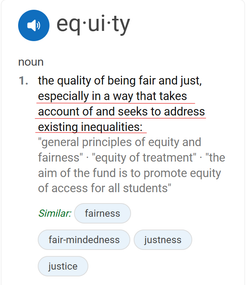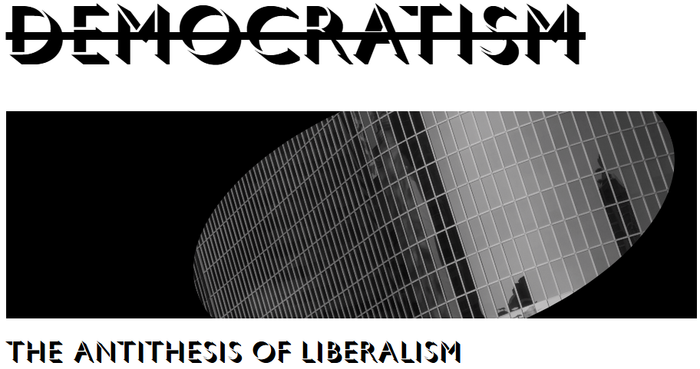Equity is Evil
First, equity is a false requirement. False requirements solve the wrong problem. It’s not even a requirement that is even described clearly, but if you tried to describe it clearly, you would find it quickly decompose into petty discriminations, which would be embarrasing to any promoter of equity, who I will describe as an equitist.
Equity is promoted as a way of distributing goods to more people, but it never means distribution to all living humans. There are several good reasons not to include all living humans, because equitism is a false requirement, but the equitists themselves will be the first to start targetting demographic categories as being less deserving, and who their campaign of equitable redistribution will take from.
And second, equity is a false requirement because it can never be achieved. It can’t even mildly be achieved, and the real architects of the equity agenda know this. Even upon cursory examination, equal access to a product made by humans, such as AI inferrence, serves no purpose. Should, for instance, inferrence compute resources be allocated to people who don’t want to use it? This is a non-trivial question because a significant initial cost of developing a new product made by and for humans is promotion.
The economic category of promotion is concerned with converting people who do not want to use a product into people who do want to use a product. It is a significant portion of the early cost of bringing a product to market. The market-based promoter already wants to expand the use of his product to the whole of the earth, but he is intelligent enough to be honest with himself and others about who he will target first. He targets people who he can convince to use his product so much that they will pay him to use it.

While the equitist also wants to expand the usage of the product he is promoting, he is much less honest about his primary target. You can ask anyone to give a clear statement of the ideal profile for campaigns of equity that aren’t already part of regular market promotion. They won’t be able to do it. An equitist could ride a long way on the back of the regular market promoter who already tries to expand his market to the whole of the Earth, but at some point the equitist must hop off his free ride and take some steps for himself, and that is exactly where the equitist falls down.
This is where the equitist must admit that he doesn’t just want to promote usage of the product to people who might be persuaded to use it but can’t pay at the moment, because the regular promoter is already out there in front of him with payment plans, free trials, package deals, bulk pricing for resellers and a host of ancient and well-understood processes to smooth way for new users and even develop whole new markets.
It’s at that point that the equitist must admit how he’s going to pay for the long ride he’s taken on the back of the regular market promoter. And that’s where he will reveal for the first time the plan that he calls “equity”.
The “equity” agenda, if it is anything at all beyond the regular promotion of a product, is the plan to expand the use of his product beyond any market purpose for the use of the product. The regular promoter is already working on expanding the product to everyone else.
The equitist wants to expand it not just to people who can’t pay now but to people who never will pay for the product that they use.
That’s the only way that he can expand the market reach of the product beyond with the regular promoter is already struggling to expand to.
So it is at that point that The equitist hops off the back of the salesman who he has ridden so far on in his quest of market expansion, that he turns around to him and reveals his plan to destroy everything the salesman has achieved.
“I will expand the use of this product to people who never will pay for it because they don’t even believe in paying for it”, the equitist says.
He then stabs the salesman in the back, shoots the CEO of the company that created the product in the back, pulls up the tent stakes and collapses the whole manufactory down upon them and sets it all on fire.
The equitist then walks off with the cart of products produced by the dead men and their families and communities and looks for the nearest armed violent thugs to implement the next phase of his diabolical, but still yet unstated plan of redistributive plunder.
And then begins a new day, but the star that rises in the sky shines only a darkness that is much, much worse than blindness.
